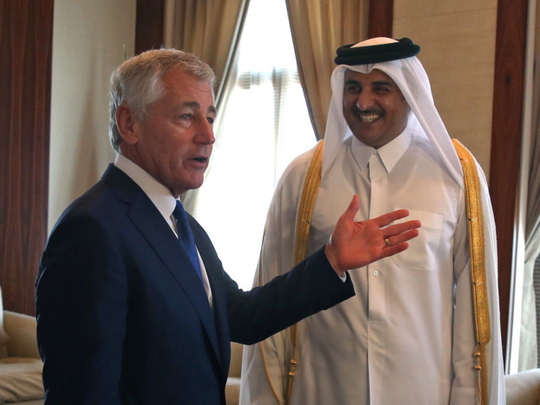
The news, announced by US President Barack Obama himself, about Qatar’s role in the release of the American soldier captured five years ago by the Taliban in Afghanistan, is another well-earned reward for Doha’s links to militant Islamist groups. The president and his Defence Secretary Chuck Hagel confirmed that “the United States has coordinated closely with Qatar to ensure that security measures are in place and the national security of the United States will not be compromised”. And Obama credited the Emir of Qatar, Shaikh Tamim Bin Hamad Al Thani, for his efforts, saying: “The Emir’s personal commitment to this effort is a testament to the partnership between our two countries.” Despite the rhetoric, some of it in American media, about Qatar’s support for jihadists (or even “terrorist”) groups and conclusions that Washington is “not happy” about it, these Qatari links are still important to the US and the West in general.
No one should expect Qatar to drop it — that important card it has got, and one that is helping its foreign policy ambitions. Mediation between US and Taliban goes back a while, and a couple of years ago, direct ‘peace talks’ between the two parties had started in Doha. Actually, the entire Al Qaida and Osama Bin Laden drama involved a Qatari role even before 9/11. But since 9/11, and the fact that many of the terrorists involved were Saudis, Qatar became central in the West’s global war on terror. The traditional role of Saudi Arabia as the vanguard of Islam was overtaken by Qatar’s recently-nourished links with Islamist groups, ranging from Al Qaida and the Taliban to Hamas and the Muslim Brotherhood.
Since the mid-1990s, Qatar has opted for a foreign policy that will give the tiny, oil-and-gas rich Gulf country regional and possibly international prominence. The main step was to get out of the Saudi tutelage and it started with the media. Qatar launched the Al Jazeera satellite channel that quickly outpaced the first pseudo-independent Arab satellite channel, MBC, which was the Saudi flagship broadcast from London and was later moved to Dubai. Al Jazeera quickly became the most significant weapon in Qatar’s soft-power arsenal and was also used to annoy the Saudis and other traditional regional powers. However, the more important element in Qatari foreign policy was the establishment of contacts with militant groups and political Islam in general (and not only Sunni, as Doha nurtured cozy relations with the Lebanese Hezbollah too). Though the dominant trend in Qatar was the Wahabi tradition (the version of Sunni Islam followed in Saudi Arabia), the new leadership of abdicating Emir Shaikh Hamad Bin Khalifa Al Thani cultivated a close relationship with the Muslim Brotherhood and used it to establish contacts with militant groups — almost all of them came out of the Brotherhood umbrella.
The US, the West and almost all the world would turn to Doha if they have to do anything with these militant groups. The Saudis lost some of the clout they used to have and Qatar even ventured into areas that were previously exclusively meant for Saudi Arabia. Lebanon was an important example when Doha mediated the latest reconciliation that led to a sort of a stable tenure of outgoing president Michel Sulaiman. Even though Qatari and Saudi stances on the Syria conflict look the same, Doha did not compromise much of its relationship with Iran while maintaining its links with some militants opposed to the Iranian-backed regime in Damascus. All this was tolerated by the Gulf countries as a fact of differences of opinion between sovereign countries even though they are all members of the Gulf Cooperation Council. But when Qatar’s support to Brotherhood threatened the security of other Gulf states, Saudi Arabia, UAE and Bahrain pulled their ambassadors out from Doha in March as a mark of protest. Efforts to reconcile the rift between Qatar and its sisterly neighbours are yet to bear fruit. And Doha argues that its relationship with the Brotherhood or any other group is part of its sovereign foreign policy, which it will not change as dictated by others — even if they are sisterly neighbours.
Whatever the outcome of Gulf reconciliation based on Qatar changing its policy, it may be too late for Doha to relinquish its important regional and international playing card. Its cordial relationship with such groups and factions gave it a leverage that will be difficult to sacrifice. If any other country had these cards — like Al Jazeera and influence with militant groups — how could it be asked to drop it, after all that such leverage has achieved in positioning Qatar on the regional stage? Some had argued that these relationships could backfire — giving Libya as an example. Former Qatari premier and the architect of its foreign policy, Shaikh Hamad Bin Jasem, said in an interview with Charlie Rose of PBS last month that Qatar went into Libya with the US to get rid of Muammar Gaddafi. That implicitly meant refuting any accusation that Qatar-supported militant groups had killed the US ambassador in Benghazi. Actually, the Qatari role in the US administration’s deal with the Taliban quashes any speculation that America is not happy with Qatar’s links with militants from Afghanistan to Somalia.
Dr Ahmad Mustafa is an Abu Dhabi-based journalist.










